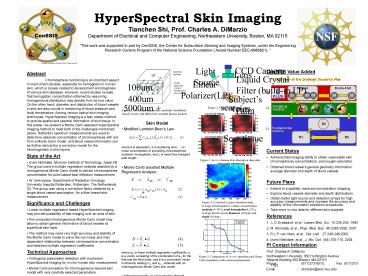HyperSpectral Skin Imaging - PowerPoint PPT Presentation
1 / 1
Title:
HyperSpectral Skin Imaging
Description:
Chromosphere monitoring is an important aspect in most of skin studies, ... dependent relationship between chromosphere concentration and obtained multiple ... – PowerPoint PPT presentation
Number of Views:95
Avg rating:3.0/5.0
Title: HyperSpectral Skin Imaging
1
HyperSpectral Skin Imaging Tianchen Shi, Prof.
Charles A. DiMarzio Department of Electrical and
Computer Engineering, Northeastern University,
Boston, MA 02115 This work was supported in
part by CenSSIS, the Center for Subsurface
Sensing and Imaging Systems, under the
Engineering Research Centers Program of the
National Science Foundation ( Award Number
EEC-9986821),
- CenSISS Value Added
- Current Status
- Achieved fast imaging ability to obtain
reasonable skin chromospheres concentrations, and
oxygen saturation. - Obtained blood vessels general geometry
information average diameter and depth of blood
vessels. - Future Plans
- Extend to a spatially resolved concentration
mapping. - Explore blood vessels diameter and depth
distributions - Obtain better light source and detection arrays
for high accuracy measurements,and increase the
accuracy and stability of the information
extraction procedures. - Take more in-vivo data for different skin
subjects.
- Abstract
- Chromosphere monitoring is an important aspect
in most of skin studies, especially for
hemoglobin in human skin, which is closely
related to development and diagnosis of various
skin diseases. However, recent studies reveals
that hemoglobin concentration obtained by
assuming homogeneous distribution may deviate
from its true value. On the other hand, diameter
and distribution of blood vessels in skin are
also crucial in monitoring of blood pressure and
body temperature. Among various optical skin
imaging techniques, HyperSpectral Imaging is a
fast, stable method to provide spatial and
spectral information of skin tissue. In this
poster, we present a Monte Carlo assisted
HyperSpectral imaging method to meet both of the
challenges mentioned above. Reflection spectrum
measurements are used to determine absolute
concentration of chromospheres with aid from a
Monte Carlo model, and blood vessel information
can be further derived by a correction model for
the inhomogeneity in skin layers. - State of the Art
- Izumi Nishidate, Muroran Institute of
Technology, Japan 4. The group used a multiple
regression analysis assisted by a homogeneous
Monte Carlo model to extract chromospheres
concentration for point based total reflection
measurement. - W. Verkruysse, Department of Radiation Oncology,
University hospital Rotterdam, Rotterdam, The
Netherlands 3. The group was using a correction
factor obtained by a single blood vessel
assumption for a fiber based skin measurement. - Significance and Challenges
- Linear multiple regression based HyperSpectral
imaging may provide possibility of fast imaging
over an area of skin. - Pre-computed inhomogeneous Monte Carlo model may
allow to obtain general information of blood
vessels at superficial skin layer. - The method may need very high accuracy and
stability of the Monte Carlo model to solve the
non-linear and inter dependent relationship
between chromosphere concentration and obtained
multiple regression coefficients. - Technical Approaches
- Orthogonal polarization detection with
incoherent HyperSpectral imaging for in-vivo
human skin measurement. - Monte Carlo simulation for inhomogeneous layered
skin model with very carefully selected
parameters. - Fast 2-D imaging with linear multiple regression
analysis and non-linear conversion by
pre-computed Monte Carlo results.
Figure 2, Experiment Setup Layout
Figure 1, Two-layer skin model randomly
distributed blood vessels with diffusively
incident photon packets.
- Skin Model
- Modified Lambert-Beers Law
- where A is absorption, S is scattering term, ?
is molar concentration of prevailing
chromospheres (melanin, hemoglobin), and L is
mean free transport path length. - Monte Carlo assisted Multiple Regression
Analysis - where am is linear multiple regression
coefficients, a is a vector consisting of the
combination of am for the first and the third
order, and b is a conversion vector nonlinearly
relating Cm and am , obtained with an
inhomogeneous Monte Carlo skin model. - Inhomogeneity in skin model (blood vessels)
Figure 3, In-vivo human skin absorption data cube
Figure 4, Extracted oxygen saturation map,
average chromospheres volume concentration
melanin (4.30), total hemoglobin(0.32), average
blood vessels diameter (101um) and depth (164um)
Figure 5, Comparison of in-vivo spectrum and
Monte Carlo simulation with extracted parameters































